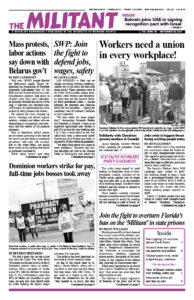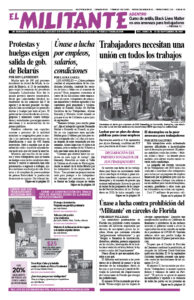For years Washington’s global trade and banking sanctions against North Korea — continued even as President Donald Trump and North Korean leader Kim Jong Un began a series of talks in 2018 — have increased shortages and worsened conditions facing millions of working people there. Now the impact of its “maximum pressure” campaign is being exacerbated by the coronavirus pandemic sweeping the world and the severe typhoons and monsoon flooding that have hit North Korea.
When the talks between the U.S and both North and South Korean governments began, it raised the possibility of a breakthrough toward the denuclearization of the Korean Peninsula. But little lasting progress has been registered. Although the government of the Democratic People’s Republic of Korea dismantled some of its nuclear facilities and ceased testing intercontinental missiles, Washington has not eased its economic assault. This has prevented any further progress.
International aid groups that provide medical supplies, food and other aid to the North say that the tightening of sanctions since 2017 forced them to cut back on deliveries. Even though the sanctions are not supposed to apply to these groups, banks have refused to handle their transactions.
Sanctions delayed the arrival of 10,000 coronavirus test kits and protective equipment for several months.
Three typhoons in the last three weeks on top of earlier monsoon flooding, causing dozens of casualties, have made the situation worse. According to the government’s Korean Central News Agency, at least 40 miles of roads, 17,000 homes, dozens of public buildings and 59 bridges were “destroyed or inundated” by the storms. Tens of thousands of acres of rice and other crops were ruined.
Kim had announced in mid-August that because of COVID-19 the government was not requesting “any outside aid for the flood damage.” In an attempt to prevent spread of the disease, the government closed its border with China, the country’s main trading partner.
Meanwhile, beginning Aug. 18 the U.S. and South Korean governments organized a 10-day, mostly computer-simulated, joint military maneuvers that target North Korea.
In recent years Washington has reduced its inflammatory military exercises, which carried a constant threat of war against North Korea.
The U.S. government must “Cancel all war games now!” wrote Steve Clark for the Socialist Workers Party, in a Sept. 9 letter to the North Korean government, sent on the anniversary of the founding of Democratic People’s Republic of Korea. Washington must also halt its “missile defense” operations with the Japanese government, Clark wrote. These also target the DPRK.
Korea was divided into North and South, against the will of the Korean people following World War II.
With the agreement of the Stalinist regime in Moscow, U.S. troops occupied the South, where Washington installed the bloody dictatorship of Syngman Rhee. In the North, workers and farmers carried out a revolution that put an end the rule of capitalists and landlords.
Washington carried out a devastating war between 1950 and 1953, to try to reverse the conquests of the Korean people. More than 4 million were killed, including at least 2 million civilians. Carpet bombing reduced northern Korean cities to rubble.
In the first ever military defeat for U.S. imperialism, Korean workers and peasants, aided by Chinese volunteers, pushed U.S. forces back to the 38th parallel and fought them to a stalemate. Washington agreed to a permanent cease-fire, but to this day refuses to sign a peace treaty. It still has 28,500 troops stationed in the South and hundreds of fighter jets and bombers, including nuclear-capable ones.
A decision by Washington to end all war games and finally to sign a peace accord to end the 1950-53 war “would lay the basis for a treaty with the DPRK to end deployment by any government of nuclear arms on the Korean Peninsula and in its air and waters,” Clark wrote. “Such an agreement would be hailed by working people in Asia and the world over, who aspire to live free from the threat of weapons of mass destruction.”
He pointed to struggles waged by working people in the U.S., from union fights to protests against cop brutality, writing that workers engaged in such battles “can and will be won to opposing the brutal imperialist sanctions and wars of the capitalist class, its political parties and its government.”
Getting U.S. military forces out of Korea and establishing a nuclear-free Korean Peninsula would put working people in Korea in the best position to advance the reunification of their country.

